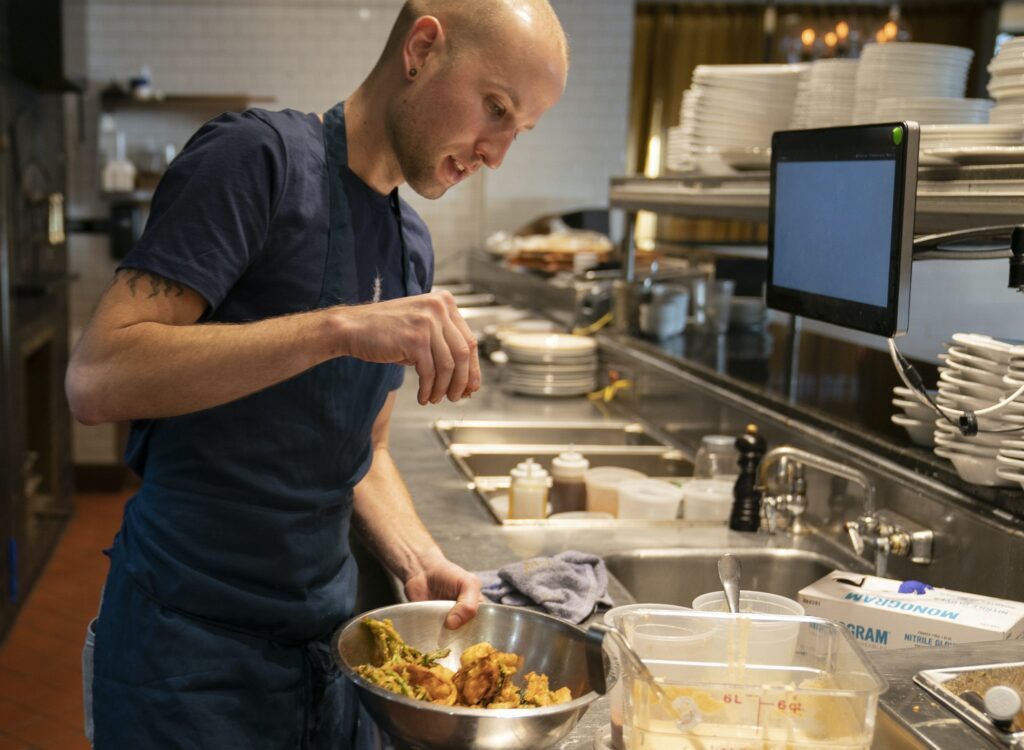Food waste is a major environmental and ethical issue, with one-third of all food produced worldwide lost or wasted before consumption, equating to approximately 1.3 billion tonnes of food each year with a value of $1tn. Restaurants produce approximately 11.4 million tonnes of food waste in the US each year. Sustainable practices being adopted by the industry include “nose-to-tail” cooking, using left-over ingredients, and donating excess food to local food banks. Prominent chefs such as Dan Barber and Marcus Samuelsson have started initiatives to reduce food waste. Legislation to reduce food waste has been implemented in France, Italy and the United States. Non-profit organisations are also working to reduce food waste.
Fighting Food Waste: Restaurants and Chefs Take on the Issue
Introduction
Food waste has become a major environmental and ethical concern in recent years. According to the United Nations, one-third of all food produced worldwide is lost or wasted before it can be consumed. This equates to approximately 1.3 billion tonnes of food each year, with a value of $1 trillion. In addition, food waste is a significant contributor to greenhouse gas emissions, as decomposing food produces methane, a potent greenhouse gas.
The Restaurant Industry’s Role
The restaurant industry has a significant role to play in reducing food waste. According to a report by the National Restaurant Association, restaurants in the United States produce approximately 11.4 million tons of food waste each year. However, many restaurants and chefs are taking steps to reduce this waste and become more sustainable.
Sustainable Practices in Restaurants
Many restaurants are adopting sustainable practices to reduce food waste. For example, some restaurants are implementing “nose-to-tail” cooking, which involves using all parts of an animal to reduce waste. Other restaurants are using left-over ingredients to create new dishes or donating excess food to local food banks.
Chefs and Food Waste
Chefs also have an important role to play in fighting food waste. Several prominent chefs have spoken out on the issue and have started initiatives to reduce it.
Dan Barber
Dan Barber, chef and co-owner of Blue Hill restaurant in New York, has become a vocal advocate for reducing food waste. He has started a project called “WastED,” in which he creates dishes using food that would normally be discarded, such as vegetable pulp and meat trimmings. The project has received widespread attention and has inspired other chefs to reduce food waste in their own kitchens.
Marcus Samuelsson
Chef Marcus Samuelsson, owner of several restaurants including Red Rooster in New York, has also made reducing food waste a priority. He has implemented several sustainable practices in his restaurants, such as composting and using locally sourced produce. He has also started a program called “Harlem Serves Up!” which provides meals to the community using surplus food from his restaurants.
The Future of Fighting Food Waste
The fight against food waste is ongoing, and many individuals and organizations are working to reduce it. In addition to restaurants and chefs, governments and non-profit organizations are also taking action.
Legislation
Several countries have implemented legislation to reduce food waste. France, for example, has banned supermarkets from throwing away unsold food and requires them to donate it to charities. Similar legislation has been proposed in other countries, including Italy and the United States.
Non-Profit Organizations
Non-profit organizations such as the World Wildlife Fund and Feeding America are also working to reduce food waste. Feeding America operates a network of food banks that distributes surplus food to those in need, while the World Wildlife Fund has launched a campaign called “No Food Left Behind,” which aims to reduce food waste through education and awareness.
Conclusion
The issue of food waste is complex and multifaceted, but restaurants, chefs, governments, and non-profit organizations are all taking steps to reduce it. By working together, we can create a more sustainable food system and reduce the impact of food waste on the environment and society.
